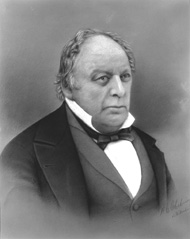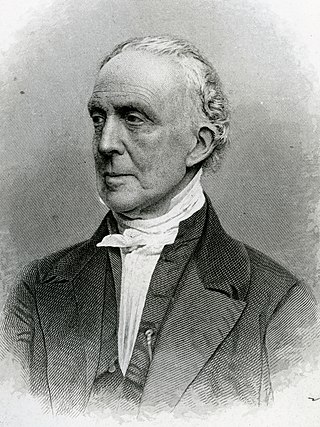| |||||||||||||
| |||||||||||||
| |||||||||||||
The 1824 Boston mayoral election saw the reelection of incumbent Josiah Quincy III. It was held on April 12, 1824. Quincy was unopposed. [1]
| |||||||||||||
| |||||||||||||
| |||||||||||||
| Elections in Massachusetts |
|---|
 |
The 1824 Boston mayoral election saw the reelection of incumbent Josiah Quincy III. It was held on April 12, 1824. Quincy was unopposed. [1]
| Candidate | Votes | % | |
|---|---|---|---|
| Josiah Quincy III (incumbent) | 3,867 | 97.90 | |
| Scattering | 83 | 2.10 | |
| Total votes | 3,950 | 100 | |

Quincy is a city in Norfolk County, Massachusetts, United States. It is the largest city in the county. Quincy is part of the Greater Boston area as one of Boston's immediate southern suburbs. Its population in 2020 was 101,636, making it the seventh-largest city in the state. Known as the "City of Presidents", Quincy is the birthplace of two U.S. presidents—John Adams and his son John Quincy Adams—as well as John Hancock, the first signer of the Declaration of Independence and the first and third governor of Massachusetts.

Faneuil Hall is a marketplace and meeting hall located near the waterfront and today's Government Center, in Boston, Massachusetts. Opened in 1742, it was the site of several speeches by Samuel Adams, James Otis, and others encouraging independence from Great Britain. It is now part of Boston National Historical Park and a well-known stop on the Freedom Trail. It is sometimes referred to as "the Cradle of Liberty", though the building and location have ties to slavery.

Quincy Market is a historic building near Faneuil Hall in downtown Boston, Massachusetts. It was constructed between 1824 and 1826 and named in honor of mayor Josiah Quincy, who organized its construction without any tax or debt. The market is a designated National Historic Landmark and a designated Boston Landmark in 1996, significant as one of the largest market complexes built in the United States in the first half of the 19th century. According to the National Park Service, some of Boston's early slave auctions took place near what is now Quincy Market.

Harrison Gray Otis, was a businessman, lawyer, and politician, becoming one of the most important leaders of the United States' first political party, the Federalists. He was a member of the Otis family.

Alexander Parris was a prominent American architect-engineer. Beginning as a housewright, he evolved into an architect whose work transitioned from Federal style architecture to the later Greek Revival. Parris taught Ammi B. Young, and was among the group of architects influential in founding what would become the American Institute of Architects. He is also responsible for the designs of many lighthouses along the coastal Northeastern United States.

Josiah Quincy III was an American educator and political figure. He was a member of the U.S. House of Representatives (1805–1813), mayor of Boston (1823–1828), and President of Harvard University (1829–1845). The historic Quincy Market in downtown Boston is named in his honor. A panel of 69 scholars in 1993 ranked him among the ten best mayors in American history.

John Phillips was an American politician, serving as the first mayor of Boston, Massachusetts, from 1822 to 1823. He was the father of abolitionist Wendell Phillips.

Thomas Aspinwall Davis was a silversmith and businessman who served as mayor of Boston for nine months in 1845.

The 1822–23 United States Senate elections were held on various dates in various states. As these U.S. Senate elections were before the ratification of the Seventeenth Amendment in 1913, senators were chosen by state legislatures. Senators were elected over a wide range of time throughout 1822 and 1823, and a seat may have been filled months late or remained vacant due to legislative deadlock. In these elections, terms were up for the senators in Class 2.
The Boston mayoral election of 1895 occurred on Tuesday, December 10, 1895. Democratic nominee Josiah Quincy defeated Republican incumbent mayor Edwin Upton Curtis and one other contender to win election to his first term.

A statue of Josiah Quincy III by Thomas Ball is installed outside Boston's Old City Hall, in the U.S. state of Massachusetts. The sculpture belongs to the City of Boston.

The Boston City Charter is a series of State statutes which codifies a system of rules for the government of the City of Boston, Massachusetts. The Charter is not a typical city constitution but rather a series of amendments, General Court rulings, and case law which form the basis of government. The central organs of the Boston City Charter are the Mayoral Office and City Council. The composition of these offices, their term length, manner of election, and scope of power have changed throughout the years.
The 1847 Boston mayoral election saw the reelection of Whig Party incumbent Josiah Quincy Jr. to a third consecutive term. It was held on December 13, 1847.
The 1846 Boston mayoral election saw the reelection of Whig Party incumbent Josiah Quincy Jr. It was held on December 14, 1846.
The December 1845 Boston mayoral election saw the election of Whig Party nominee Josiah Quincy Jr. It was held on December 8, 1845.
The 1828 Boston mayoral election saw the election of Harrison Gray Otis. The election required three votes, because no candidate secured the required majority in the first two votes. After failing in the first two votes, incumbent mayor Josiah Quincy III declined to run in the third round.
The December 1825 Boston mayoral election saw the reelection of incumbent Josiah Quincy III to a fifth consecutive term. It was held on December 12, 1825. Quincy was unopposed.
The April 1825 Boston mayoral election saw the reelection of incumbent Josiah Quincy III to a third consecutive term. It was held on April 11, 1825. Quincy was unopposed.
The 1823 Boston mayoral election saw the election of Josiah Quincy III. It was held on April 14, 1823. His opponent was George Blake, the U.S. district attorney for District of Massachusetts.
The 1822 Boston mayoral election saw the election of John Phillips as the inaugural mayor of Boston. The first vote, held on April 9, 1822, did not result in any candidate receiving the required majority of the vote, resulting in a second vote held on April 16, 1822, which Phillips won.